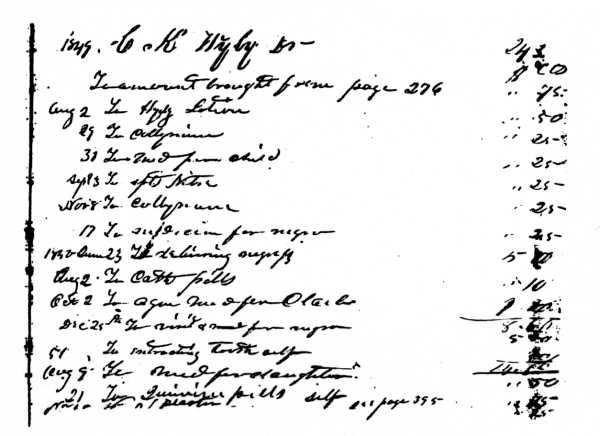TOMBSTONE INSCRIPTIONS FROM BLACK CEMETERIES
IN BENTON COUNTY, TENNESSEE
(Revised Edition with Maps)
Compiled by Jonathan K. T. Smith
Copyright, Jonathan K. T. Smith, 1995
(Page 64)
DR. MILTON TRAVIS' DAY-BOOK, 1843-1861
Dr. MILTON L. TRAVIS (January 27, 1822-April 4, 1878), an able and methodical medical practitioner of his time, entered brief entries in his day-book, 1843-1861, about the many individual accounts in his practice, enough so that his comments are of considerable value to genealogists as well as social historians. This day-book is presently owned by the Benton County Library in Camden where, with permission of the librarian, it may be used as a research source by responsible patrons of the library.
The information in this day-book indicates that some slaveowners provided their bondsfolk with appropriate medical care and the absence of such mentions in the accounts of other slaveowners may suggest that they were not as attentive that way or were variously indifferent to the welfare of their servants.
For persons with black ancestry in antebellum Benton County the day-book is useful in some mentions of slaves who became ancestors and in some instances may even lend to the identity of such persons or of individuals, hence interesting information regarding these individuals.
There are numerous entries similar to that found in the account of Colonel THOMAS JONES on March 13, 1844 (page 6), "To visits and medicine for negroes, $1.00." The names of those individuals who had their slaves examined in this manner, from time to time, include ELIJAH HERRIN (page 72), SETH UTLEY (page 97), PERRY MELTON (page 127), WYLY ARNOLD (page 143), JORDAN G. SIMS (page 189), ANDREW J. BARNETT (page 260), ELIJAH PENICK (page 282), THOMAS J.PERKINS (page 282), IRA JONES (pages 306, 360), MANSFIELD C. BARNETT (page 336), JOHN C. McDANIEL (page 338), HENRY C. CAMP (page 345), WILSON C. PREWITT (page 355), ALFRED P. HALL (page 364).
Individuals who paid for such medical treatment for their servants along with more extensive treatment would include JAMES WYLY who paid $10 for
(Page 65)
the femur-setting of a free-black, KENDRICK BLACKWELL, who helped to manage his farm, October 7, 1850 and 25¢ for a vesecatory for his servant, JOHN, October 23, 1850 (page 206). HUGH M. BROWN paid 50¢, February 27, 1848 for the extraction of teeth of one of his servants; December 11, 1848 paid $10 for the delivery of a black woman's child; $5, October 11, 1849 for the same service; again, $5, for the same service, January 20, 1852; once again $5, February 15, 1852 for the same service. On January 7, 1856, CULLOM NOWEL paid $1 for the treatment of a black child. At various times, IRA LOVE paid for quinine for his and WILLIAM JONES' slaves in their coping with malaria (pages 306, 360).
Dr. Travis delivered another child, that of one of W. C. PREWITT's servants, March 15, 1851 for a $5 fee (page 355); another birth was attended for one of this man's servants, July 12, 1855 for a $5 fee (page 425). Christopher K. Wyly was charged $9 for visits and medication for one of his servants from August 17-21, 1845 (page 172); for malarial medication for the servant, DANIEL, October 4, 1849 for $1 fee (page 173); the same for SOPHIA, October 23 and November 1, 1849, 73¢ and $1 (IBID. ); $5 for delivery of a child of one of his servants, June 23, 1850 (page 243); $4.50 for visit and medication for the servant, PETER, February 9, 1852 (page 395); he paid for more routine visits for his servants than anyone else for years (pages 173, 276, 343, 395).
An example of one of Dr. Travis' account entries (page 243):

Return to Contents